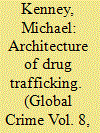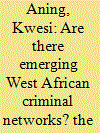|
|
|
Sort Order |
|
|
|
Items / Page
|
|
|
|
|
|
|
| Srl | Item |
| 1 |
ID:
080435


|
|
|
|
|
| Publication |
2007.
|
| Summary/Abstract |
For much of the past twenty-five years, the US-led war on drugs has been premised on a fundamental misunderstanding of Colombian drug trade. Instead of being run by a handful of massive, price-fixing 'cartels', the Colombian drug trade, then and now, was characterized by a fluid social system where flexible exchange networks expanded and retracted according to market opportunities and regulatory constraints. To support this interpretation, I draw on primary and secondary source data I collected in Colombia and the US, including interviews with several dozen hard-to-reach informants. I analyze these data to analyze the organisational form and functioning of 'Colombian' trafficking networks, focusing on how these illicit enterprises communicate, coordinate their activities, and make decisions, with an eye towards deflating some of the more persistent myths that have grown up around these transnational enterprises
|
|
|
|
|
|
|
|
|
|
|
|
|
|
|
|
| 2 |
ID:
080433


|
|
|
|
|
| Publication |
2007.
|
| Summary/Abstract |
This paper situates discussions about emerging African Criminal Networks (ACN) within Ghana specifically, and West Africa generally, and seeks to present the initial results of an empirically based study on the activities of transnational organised criminal (TOCs) groups in Ghana. The paper argues that the nature of state and statehood in Africa and its inability to establish effective regulatory mechanisms contributes to the rise of these particular types of criminal groups. It begins by conceptualising the place of Ghanaian and West African criminal groups within the framework of international crime. Furthermore, it undertakes an in-depth analysis of three types of crimes; namely computer and internet crime, drug trafficking and (artisanal) small arms manufacture and smuggling in Ghana. By applying a set of standard variables and criteria, the paper evaluates the growth of TNCs in these three issue-areas and how such activities potentially undermine public institutions like the Ghana Police Service (GPS), customs, excise and preventive services (CEPS), judiciary, banking and political parties and political institutions in Ghana. Finally, it seeks to offer an explanatory framework for the growth and acceptance by local communities of the activities of organised crime in Ghana by situating this within a cultural ethos and the social welfare roles played by those involved in such crimes
|
|
|
|
|
|
|
|
|
|
|
|
|
|
|
|
| 3 |
ID:
080434


|
|
|
|
|
| Publication |
2007.
|
| Summary/Abstract |
Policing counter terrorism is increasingly seen as key task for police forces spanning the entire spectrum of size and capability. However, in the case of many police forces, resource limitations, low threat levels and coordination with national level law enforcement have combined to limit the expansion of their counter terrorism efforts to things like minor increases in training and heightened awareness. There are however, at the other end of the spectrum, some city police forces that have drastically reorganized and reoriented their day-to-day operations in response to heightened threats. Relying on their unique access to resources, political autonomy and unique threat levels, New York City and London have internationalized their policing efforts in an unprecedented way. This article explores the similarities, differences and dynamics of this phenomenon
|
|
|
|
|
|
|
|
|
|
|
|
|
|
|
|
|
|
|
|
|